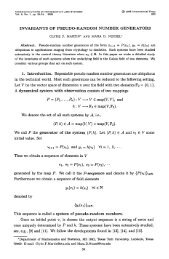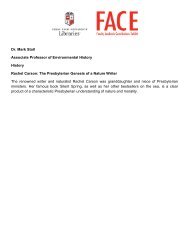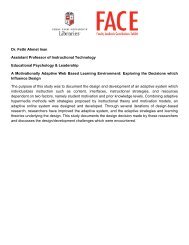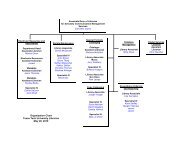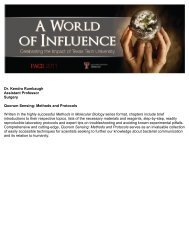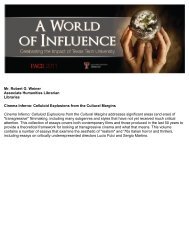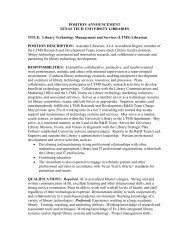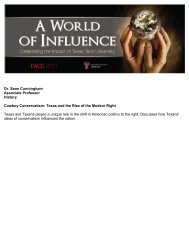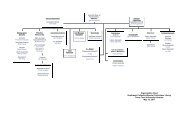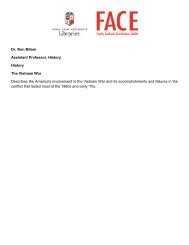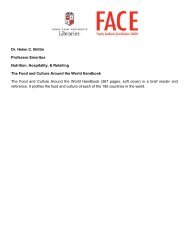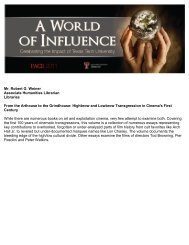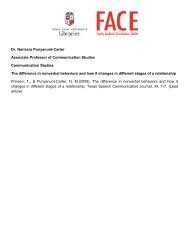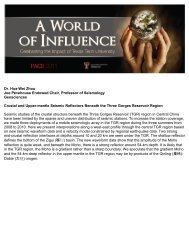Nonprofit Organizations Law and Policy Third Edition - Libraries ...
Nonprofit Organizations Law and Policy Third Edition - Libraries ...
Nonprofit Organizations Law and Policy Third Edition - Libraries ...
You also want an ePaper? Increase the reach of your titles
YUMPU automatically turns print PDFs into web optimized ePapers that Google loves.
20 OVERVIEW OF THE NONPROFIT SECTOR CH. 1<br />
<strong>and</strong> fair exposition" st<strong>and</strong>ard, on the basis of which the denial of BMR,<br />
Inc.'s application for tax exemption was upheld by the court below, is<br />
vague both in describing who is subject to that test <strong>and</strong> in articulating its<br />
substantive requirements. The history of appellant's application for taxexempt<br />
status attests to the vagueness of the "full <strong>and</strong> fair exposition"<br />
test <strong>and</strong> evidences the evils that the vagueness doctrine is designed to<br />
avoid. The district court's decision was based on the value-laden conclusion<br />
that BMR was too doctrinaire. Similarly, IRS officials earlier advised<br />
appellant's counsel that an exemption could be approved only if the<br />
organization "agree(d) to abstain from advocating that homosexuality is a<br />
mere preference, orientation, or propensity on par with heterosexuality<br />
<strong>and</strong> which should otherwise be regarded as normal." Whether or not this<br />
view represented official IRS policy is irrelevant. It simply highlights the<br />
inherent susceptibility to discriminatory enforcement of vague statutory<br />
language.<br />
* * *<br />
We are not unmindful of the burden involved in reformulating the<br />
definition of "educational" to conform to First Amendment requirements.<br />
But the difficulty of the task neither lessens its importance nor warrants<br />
its avoidance. Objective st<strong>and</strong>ards are especially essential in cases such as<br />
this involving those espousing nonmajoritarian philosophies. In this area<br />
the First Amendment cannot countenance a subjective "I know it when I<br />
see it" st<strong>and</strong>ard. And neither can we.<br />
Reversed <strong>and</strong> rem<strong>and</strong>ed.<br />
NATIONAL ALLIANCE v. UNITED STATES<br />
United States Court of Appeals, D. C. Circuit, 1983<br />
710 F.2d 868<br />
FAIRCHILD, SENIOR CIRCUIT JUDGE:<br />
On July 28, 1977, National Alliance applied to the IRS for a tax<br />
exemption as a charitable <strong>and</strong> educational institution under 26 U.S.C.<br />
§ 501(c)(3). The IRS District Director in Arlington, Virginia denied the<br />
corporation's application on March 31, 1978, concluding that National<br />
Alliance was neither "charitable" nor "educational" as those terms are<br />
applied by Treas.Reg. § 1.501(c)(3)-(1)(d)(2) & (3).<br />
National Alliance, a Virginia corporation, publishes a monthly newsletter<br />
<strong>and</strong> membership bulletin, organizes lectures <strong>and</strong> meetings, issues<br />
occasional leaflets, <strong>and</strong> distributes books; all for the stated purpose of<br />
arousing in white Americans of European ancestry "an underst<strong>and</strong>ing of<br />
<strong>and</strong> a pride in their racial <strong>and</strong> cultural heritage <strong>and</strong> an awareness of the<br />
present dangers to that heritage." The Treasury Regulation sometimes<br />
said to "define" the statutory term "educational" provides that:<br />
"[a]n organization may be educational even though it advocates a<br />
particular position or viewpoint so long as it presents a sufficiently<br />
full <strong>and</strong> fair exposition of the pertinent facts as to permit an individu-



